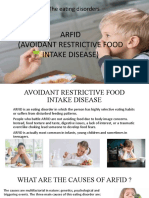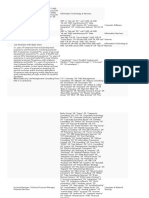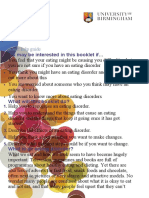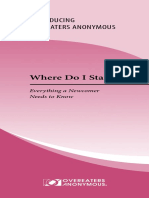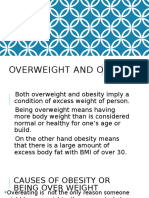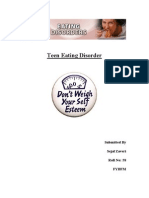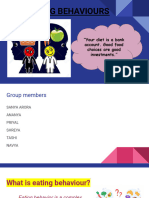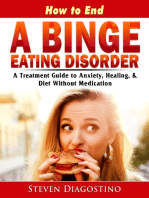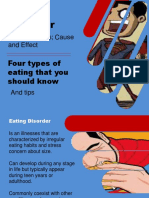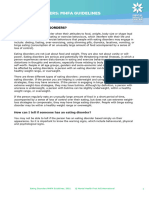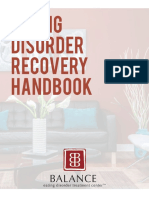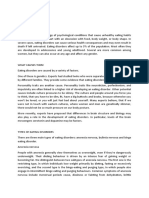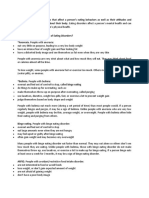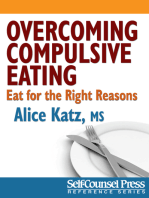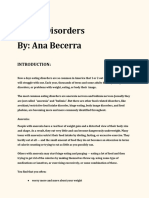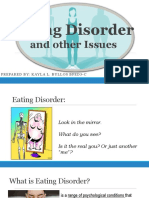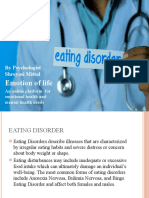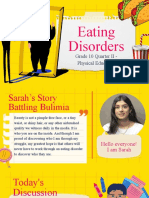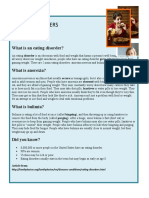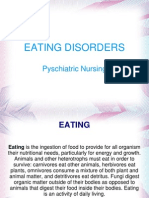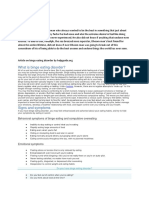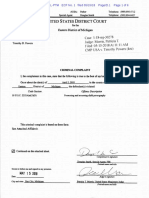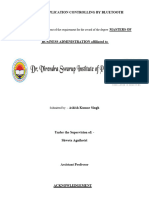How To Know If You Have An Eating Disorder (With Pictures)
How To Know If You Have An Eating Disorder (With Pictures)
Uploaded by
ZenandeCopyright:
Available Formats
How To Know If You Have An Eating Disorder (With Pictures)
How To Know If You Have An Eating Disorder (With Pictures)
Uploaded by
ZenandeOriginal Title
Copyright
Available Formats
Share this document
Did you find this document useful?
Is this content inappropriate?
Report this DocumentCopyright:
Available Formats
How To Know If You Have An Eating Disorder (With Pictures)
How To Know If You Have An Eating Disorder (With Pictures)
Uploaded by
ZenandeCopyright:
Available Formats
Quizzes
Learn why people trust wikiHow
RECOGNIZING AN EATING DISORDER ADDRESSING PSYCHOL
NUTRITION AND FOOD HEALTH » EATING DISORDERS
How to Know if You Have an
Eating Disorder
Co-authored by Trudi Griffin, LPC, MS
Last Updated: February 11, 2024 References
Download Article
Eating disorders can come in different forms but
they all affect your relationship with food and
they can cause serious health problems if left
untreated. You can learn about the behaviors,
feelings, and physical effects of eating disorders
to help you determine if you might have one. If
you think you may have an eating disorder,
make sure that you seek help as soon as
possible. Eating disorders can become much
more severe if left untreated.
Part 1 of 4:
1 Recognizing an Eating
Disorder
Recognize common emotional
1 symptoms of eating disorders. Many
individuals with disordered eating habits are
excessively concerned with body size, weight,
and appearance. Some common behavioral
and emotional symptoms that someone with an
eating disorder might have include:
feeling depressed or anxious
having a strong fear of gaining weight or of
being “fat”
desiring to withdraw from friends and
family
paying an unusual amount of attention to
food and calorie intake
having an intense fear of certain foods, like
those containing sugar or fat
steering clear of situations involving food
denying issues with food or changes in
weight
attempting to purge after overeating by
exercising, vomiting, or using laxatives
weighing yourself every day
Notice symptoms of anorexia nervosa.
2 People who suffer from anorexia are
unwilling to stay at a healthy body weight. They
are also quite frightened of gaining weight, and
they see themselves as fat, even though they
are thin or even underweight.[1] A person
with anorexia can starve the body for days, or
eat a very strict diet of a low amount of calories
each day. There is typically a sense of
accomplishment in maintaining such strict
guidelines.
You may have very strict “rules” of eating,
such as specific colors of food you avoid,
times of day you refuse to eat, or strict
caloric boundaries you observe.
You may fear being fat or experience your
body as fat, even if you are several
pounds underweight. Even if you are
extremely thin, you are never happy with
your appearance and feel like you can
always lose more weight to feel better
about yourself.
Ask yourself if your parents or friends have
commented on your weight or weight loss.
Ask yourself whether you base your
personal value on your weight, clothing
size, or what you eat.
90% off
Up to 90% off, free shipping on all orders.
Advertisement
Get clear on symptoms of bulimia
3 nervosa. People who have bulimia will
binge on a large amount of food and then
purge to try to get rid of what they just
consumed before it causes weight gain.[2]
While you know you want to avoid binge eating
and gaining weight, you cannot seem to stop
eating or having recurrent episodes of binge
eating. Once the episode ends, you may find
yourself desperate to get rid of any weight that
may result from the binge. Efforts may include
purging (vomiting), using laxatives, or diuretics.
Even if you do not purge right after eating,
you may still have bulimia if you tend to
starve yourself for days following a binge,
exercise more than usual, or follow
another type of drastic diet to avoid
gaining any weight.[3]
You may try to eat healthy and follow a
healthy (or restrictive) diet for a while, but
be overcome with tension or cravings and
end up caving under pressure into a binge.
Recognize binge eating disorder.
4 People who have binge eating disorder will
eat large amounts of food in a short space of
time and they feel like they cannot control
themselves during these episodes. The binge
is not pleasurable. While bingeing, you may
feel lots of negative emotions. These feelings
can continue after the binge is over as well.
People who binge eat do not purge after a
binge.[4]
People with binge eating disorder may feel
depressed, disgusted, and guilty over their
bingeing episodes.
You may find that you have put on a lot of
weight in a short amount of time if you
binge eat.
Understand orthorexia. Orthorexia
5 involves an obsession with only eating
"healthy" food. People with orthorexia may or
may not care about their weight or figure. They
worry excessively about the purity and health
of their food. This can look like:[5]
Compulsively checking food labels
Cutting out large groups of foods (e.g. all
sugar or all carbs) without medical reason
Refusing to eat "unhealthy" or "impure"
foods
Obsessively following "healthy eating" and
lifestyle pages on social media
Recognize Avoidant Restrictive Food
6 Intake Disorder (ARFID). People with
ARFID aren't battling cravings or fears of body
image, but fear about food. They feel anxious
about food or potential causes of eating (like
choking). In some cases, ARFID resembles
extreme "picky eating," in which the person will
only eat certain "safe foods." Signs of ARFID
include:[6] [7] [8]
Disinterest in eating
Fear of vomiting or choking (in some
cases)
Significant anxiety about trying new food
(in some cases)
Refusing large groups of foods based on
their texture, taste, smell, or color
Weight loss and associated health issues
Stunted growth in children
Did you know? Many people with ARFID
have co-occurring conditions. These can
include OCD, sensory processing disorder
(which is common in autism and ADHD),
and depression. Treatment should include
help for any sensory or mental health
problems.
Recognize pica. Pica involves repeatedly
7 eating things that aren't food and aren't
nutritious. People may eat things like paper,
ice, chalk, hair, leaves, rocks, string, and more.
They generally have no issues eating regular
food. Here's what you should know:[9]
Iron deficiency or malnutrition sometimes
cause pica. A doctor can check for any
deficiencies.
Mouthing, and occasionally eating, objects
is normal in children under 2.
If you aren't sure whether it's a problem
(e.g. eating ice cubes on occasion), ask
your doctor.
Know that the label "Eating Disorder:
8 Not Otherwise Specified" (EDNOS) is for
other types of eating disorders. If you're
struggling with a disorder that doesn't neatly fit
into one of these categories, a doctor may
diagnose you with EDNOS. Treatment will
depend on your symptoms.
If you suspect something is wrong with
your eating habits, then that's worth
exploring, even if you don't have a name
for it. Make an appointment with your
doctor and write down what's going on.
Advertisement
Part 2 of 4:
2 Addressing Psychological
Factors
Explore feelings of control. Some
1 people use anorexia or orthorexia as a
way to stay in control and feel powerful.[10]
For those with bulimia, it is common to feel out
of control and powerless.[11] And those with
binge eating disorder may also feel like they
lack control over what they eat.[12]
If you feel like your life is out of control,
you may turn to disordered eating to
harness the feeling of control in your life,
and feel accomplished when you “succeed’
in starving yourself.
Ask yourself about your relationship with
control and whether you are happy with it.
Do you find yourself wanting more or less
control in your life? Do you feel like you
have enough control over your life, or do
you take out that control on your food?
Identify feelings of shame about your
2 behaviors. You may feel ashamed of your
eating habits, especially if you binge eat.[13]
You may try to binge or purge in secret, or take
food off your plate discreetly so that nobody
will notice. While these behaviors try to cover
up what you do, deeper within them may lurk
shame for the lengths you will go in order to
keep your eating disorder.
If you find yourself feeling ashamed of
your eating behaviors, then you may have
symptoms of an eating disorder.
Consider your feelings about your
3 body. People who do not like their bodies
are more likely to develop an eating disorder.
[14] Not liking your body may include feeling fat,
ugly, undesirable, or having shame or
embarrassment about a specific part of your
physical appearance, such as scars. These
feelings may also be influenced by images of
celebrities or the people that you see every
day.[15]
You might feel like the only way to accept
your body is by losing weight. You may
think, “When I lose all the weight, I’ll finally
be happy.”
Reflect on your own beliefs about weight
and body satisfaction and ask yourself if
losing weight or “being skinny” is the only
way to feel good about your body.
Reflect on your excuses. Do you find
4 yourself hiding your habits? When asked
about your eating choices, do you lie about
why you’re not eating? What do you say when
people comment about your weight
fluctuation? If you find yourself making up
excuses for your behaviors, you may have an
eating disorder.[16]
Bending the truth may be one way for you
to keep living with an eating disorder
without anybody finding out. Do you find
yourself making excuses for how you eat?
What about finding ways to get out of
meeting people for dinner or coffee?
Take a good look at yourself. This
5 doesn’t necessarily mean go look in the
mirror, but think about how you perceive your
body. There are many ways to understand
body image. For instance, you may perceive
your body as overweight when it is actually
underweight as measured by a medical doctor.
Next, reflect on how you feel about your body:
if you feel positive or negative about your body
image, and how you see your general shape
and ability. Your thoughts and behaviors also
affect your body image, such as having
thoughts of “I’m too fat” and then isolating
yourself due to how you perceive your body.[17]
Think about the ways you perceive your
body and ask yourself whether you see
yourself accurately. Ask yourself how you
perceive your flaws and if it’s okay to have
flaws.
Notice if someone is influencing you.
6 Sometimes, people's friends, romantic
partners, or family members push unhealthy
eating habits. This person may make negative
comments about your body, criticize what you
eat, or try to control whether and how much
you eat. Identifying bad influences in your life
can help you tease out what's happening.
For example, if your boyfriend calls you
names and criticizes what you eat,
dumping him is a good first step towards a
better life.
Advertisement
Part 3 of 4:
3 Dealing With Physical
Symptoms
Know the risks of not eating enough.
1 Restricted eating, such as in anorexia or
ARFID, takes a major toll on the body. If you
start noticing changes in your body’s
functioning, you may be experiencing the
effects of a restricted diet. Not only does
restrictive cause dangerous weight loss, it also
can have other negative side effects, such as:
[18]
constipation or bloating
damaged teeth and gums
dry, yellow skin
brittle nails
headaches
fainting, weakness, and dizziness
bone density loss
a layer of fine hair that grows all over the
body and face (thicker than typical "peach
fuzz")
memory problems and sluggish thinking
depression and moodiness
not having a period
Notice the physical effects of excessive
2 vomiting. People with bulimia tend to
show some physical symptoms as a result of
the disorder, especially those who purge
(vomit). If you vomit after meals, you may
experience the following:[19]
pain in your abdomen or bloating
weight gain
swollen hands or feet
always having a sore throat or sounding
hoarse
having broken blood vessels in your eyes
having sores in your mouth
puffy cheeks (from vomiting)
tooth decay due to acid from vomit
having lots of stomach issues such as
constipation, ulcers, and acid reflux
Observe changes related to binge
3 eating. While the most obvious effect of
overeating is obesity, other health risks can
occur as a result of binge eating. In order to
fully understand any health risks associated
with binge eating, go to your medical physician
and get some blood work. Changes to health
and body related to binge eating can include:
[20]
type 2 diabetes
high cholesterol
high blood pressure
joint and muscle pain
You might also like
- Invoice To CopartDocument1 pageInvoice To CopartРуслан Павлюк100% (1)
- STOP Overeating, Beating Binge Eating And Other Eating DisordersFrom EverandSTOP Overeating, Beating Binge Eating And Other Eating DisordersRating: 3 out of 5 stars3/5 (1)
- Review For Total Archery Inside The ArcherDocument4 pagesReview For Total Archery Inside The ArcherAnonymous Bb4HYdR4cNo ratings yet
- ARFIDDocument11 pagesARFIDPirandello100% (1)
- Basic Deck Construction DetailsDocument3 pagesBasic Deck Construction Detailssea_jazzNo ratings yet
- Boolean StringsDocument47 pagesBoolean StringsMani KumarNo ratings yet
- Eating DisordersDocument21 pagesEating DisordersAhmed yacine kadriNo ratings yet
- Eating Disorders FactsheetDocument16 pagesEating Disorders FactsheetGabriela VladNo ratings yet
- Bulimia NervosaDocument11 pagesBulimia Nervosatreby NaterNo ratings yet
- Break Free From ED - 02 - What Keeps Eating Disorders GoingDocument9 pagesBreak Free From ED - 02 - What Keeps Eating Disorders Goinghm5tpcczwhNo ratings yet
- Eating Disorders - Your Guide: Key FactsDocument14 pagesEating Disorders - Your Guide: Key FactsArtaria CempakasariNo ratings yet
- Aljas NCM Eating DisorderDocument11 pagesAljas NCM Eating DisorderCzariena Jade AljasNo ratings yet
- OA: Where Do I Start Everything A Newcomer Needs To KnowDocument36 pagesOA: Where Do I Start Everything A Newcomer Needs To KnowDave100% (1)
- The Anti-Diet Workbook: Break the Diet Cycle, Practice Intuitive Eating, and Live with Total Food FreedomFrom EverandThe Anti-Diet Workbook: Break the Diet Cycle, Practice Intuitive Eating, and Live with Total Food FreedomNo ratings yet
- Eating Disorders LP 2013Document28 pagesEating Disorders LP 2013muscalualina100% (1)
- Eating Disorders 1Document11 pagesEating Disorders 1karlaNo ratings yet
- Where Do I Start Pamphlet V6Document36 pagesWhere Do I Start Pamphlet V6usyskinaNo ratings yet
- Eating DisorderDocument15 pagesEating DisorderRosiel Laguerta DrisNo ratings yet
- Anorexia Is A Disorder Where The Main Characteristic Is The Restriction of Food and The Refusal To Maintain A Minimal Normal Body WeightDocument8 pagesAnorexia Is A Disorder Where The Main Characteristic Is The Restriction of Food and The Refusal To Maintain A Minimal Normal Body Weightapi-3709572No ratings yet
- Anorexia NervosaDocument7 pagesAnorexia NervosamyraNo ratings yet
- ProjectDocument15 pagesProjectAkshat PanditNo ratings yet
- What Are Eating Behaviors12345Document19 pagesWhat Are Eating Behaviors12345rashibenrasodaNo ratings yet
- MODULE 3 Healty Eating HabitsDocument3 pagesMODULE 3 Healty Eating HabitsPamelaNo ratings yet
- Anorexia Nervosa, Also Known As Simply Anorexia, Is An Eating Disorder Characterized byDocument3 pagesAnorexia Nervosa, Also Known As Simply Anorexia, Is An Eating Disorder Characterized byChristine PunsalanNo ratings yet
- Mardie ArcesDocument23 pagesMardie ArcesMardie ArcesNo ratings yet
- How to End A Binge Eating Disorder: A Treatment Guide to Anxiety, Healing, & Diet Without MedicationFrom EverandHow to End A Binge Eating Disorder: A Treatment Guide to Anxiety, Healing, & Diet Without MedicationNo ratings yet
- Eating DisordersDocument3 pagesEating DisordersPaul Airon LingatNo ratings yet
- Signs & Symptoms of An Eating DisorderDocument2 pagesSigns & Symptoms of An Eating DisorderWrendell BrecioNo ratings yet
- Eating Disorder: Four Types of Eating That You Should KnowDocument17 pagesEating Disorder: Four Types of Eating That You Should KnowDoel ManaloNo ratings yet
- Intuitive Eating: 30 Intuitive Eating Tips & Strategies For A Healthy Body & Mind Today!: The Blokehead Success SeriesFrom EverandIntuitive Eating: 30 Intuitive Eating Tips & Strategies For A Healthy Body & Mind Today!: The Blokehead Success SeriesNo ratings yet
- Eating Disorders: 1. Anorexia NervosaDocument7 pagesEating Disorders: 1. Anorexia NervosaPaul Vincent LauretaNo ratings yet
- Major Types of ANDocument2 pagesMajor Types of ANHannah LNo ratings yet
- Eating Disorders - Mhfa Guidelines 2021Document9 pagesEating Disorders - Mhfa Guidelines 2021nikola.domagala06No ratings yet
- 6 Common Types of Eating DisordersDocument11 pages6 Common Types of Eating DisordersGrei PaduaNo ratings yet
- BALANCE Eating Disorder Recovery HandbookDocument16 pagesBALANCE Eating Disorder Recovery Handbooknn100% (2)
- Eating DisorderDocument2 pagesEating DisorderEva Marinšek0% (1)
- Eating DisorderrrrDocument6 pagesEating DisorderrrrMilagros ConstantinoNo ratings yet
- How To Stop Binge Eating All The Time - QuoraDocument1 pageHow To Stop Binge Eating All The Time - QuoraimaichaNo ratings yet
- Eating Disorders YouthDocument8 pagesEating Disorders Youthaburdeti2100% (1)
- Eating DisordersDocument37 pagesEating Disorderssanfranciscojulie22No ratings yet
- Eating DisordersDocument6 pagesEating Disordersapi-460356045No ratings yet
- Eatinf DisorderDocument23 pagesEatinf DisorderMabelle LorenzoNo ratings yet
- Example File XDocument5 pagesExample File XGabriel DATY at QuickofficeNo ratings yet
- What Is Anorexia NervosaDocument6 pagesWhat Is Anorexia Nervosaმარიამ გოგებაშვილიNo ratings yet
- Janet 2-2Document35 pagesJanet 2-2Janet OyeNo ratings yet
- Break Free From ED - 01 - What Are Eating DisordersDocument9 pagesBreak Free From ED - 01 - What Are Eating Disordershm5tpcczwhNo ratings yet
- Eating DisordersDocument15 pagesEating DisordersЯ мусурманNo ratings yet
- Mapeh 10 Lect 2nd Quarter ACTIVE RECREATIONDocument15 pagesMapeh 10 Lect 2nd Quarter ACTIVE RECREATIONCindy PontillasNo ratings yet
- Yadira Salas-Barrios - Mla Typed Final EssayDocument7 pagesYadira Salas-Barrios - Mla Typed Final Essayapi-719827232No ratings yet
- Irrational Food Consumption Behavior 2Document7 pagesIrrational Food Consumption Behavior 2MARIA TARIQNo ratings yet
- Binge Eating DisorderDocument4 pagesBinge Eating Disordereneg4530100% (1)
- Binge Eating Disorder PDFDocument4 pagesBinge Eating Disorder PDFIsidora KesićNo ratings yet
- Eatingdisorders PTG 4Document10 pagesEatingdisorders PTG 4Jhen BonNo ratings yet
- Eating Disorder PPT by Shreyasi MittalDocument35 pagesEating Disorder PPT by Shreyasi MittalPrachi gattaniNo ratings yet
- Eating DisordersDocument16 pagesEating DisordersKristine RubinoNo ratings yet
- Eating Disorders Conversation Topics Dialogs Reading ComprehensionDocument2 pagesEating Disorders Conversation Topics Dialogs Reading ComprehensionJissel SilvaNo ratings yet
- Eating Habitsdirectional TermsDocument21 pagesEating Habitsdirectional TermsRohn David SantosNo ratings yet
- Eating Disorder.. ) )Document45 pagesEating Disorder.. ) )Joy HoNo ratings yet
- The Dangers of Binge EatingDocument2 pagesThe Dangers of Binge EatingJulio AlvesNo ratings yet
- The Man Himself And...Document2 pagesThe Man Himself And...bla2blaNo ratings yet
- Grade 7 Health Q2 M4 Nov. 21 2023Document10 pagesGrade 7 Health Q2 M4 Nov. 21 2023hayafaypNo ratings yet
- Role of It Is in BankingDocument13 pagesRole of It Is in BankingrahulprajapNo ratings yet
- Allied Ii Basic Physics - IDocument1 pageAllied Ii Basic Physics - Ivickyani1986yahoo.co.inNo ratings yet
- Mark Scheme (Results) : Summer 2018Document18 pagesMark Scheme (Results) : Summer 2018Yadong ZhangNo ratings yet
- Structure Analysis - I I Lab Manual: Prepared By: Parveen Berwal Approved By: Dr. Arabinda SharmaDocument31 pagesStructure Analysis - I I Lab Manual: Prepared By: Parveen Berwal Approved By: Dr. Arabinda Sharmapiu dasNo ratings yet
- Smoking Proiect La Engleza Badan MihaiDocument5 pagesSmoking Proiect La Engleza Badan MihaiBadan AngelaNo ratings yet
- SuperValu Spanish Wine Sale BrochureDocument5 pagesSuperValu Spanish Wine Sale BrochureTom RyanNo ratings yet
- Application Form For Registration As Building ContractorDocument9 pagesApplication Form For Registration As Building ContractorAndrewNo ratings yet
- Getting Paid Note Taking Guide 2.3.9.L1 PDFDocument3 pagesGetting Paid Note Taking Guide 2.3.9.L1 PDFJulianna ChmielNo ratings yet
- KD 5 Procedure Text Lat SoalDocument10 pagesKD 5 Procedure Text Lat SoalTri MauludinNo ratings yet
- Socket Programming in JavaDocument4 pagesSocket Programming in JavaKumar SaketNo ratings yet
- Muqaddas AnwarDocument55 pagesMuqaddas AnwarJanshersandhu JanshersandhuNo ratings yet
- Making Your Haus A HomeDocument20 pagesMaking Your Haus A Homehaus and hausNo ratings yet
- Principles of Home EconomicsDocument2 pagesPrinciples of Home EconomicsCamille DelfinNo ratings yet
- LACIP Year One 2012-13 New OneDocument28 pagesLACIP Year One 2012-13 New OnehamadgondalNo ratings yet
- ENERGETICS EbookDocument96 pagesENERGETICS Ebooklianchen251110No ratings yet
- Vertical Wall Earthbag HomesDocument4 pagesVertical Wall Earthbag Homesdanut_docNo ratings yet
- English Verb Conjugation 2Document2 pagesEnglish Verb Conjugation 2elyas_t27No ratings yet
- Timothy Powers IndictmentDocument6 pagesTimothy Powers IndictmentAnonymous ibsFVcTZAANo ratings yet
- Describe Your Family RelationshipsDocument2 pagesDescribe Your Family RelationshipsVy NguyễnNo ratings yet
- CK 12 Algebra I Second EditionDocument640 pagesCK 12 Algebra I Second Editionmoshetalkar100% (2)
- Ash ProDocument36 pagesAsh Proashish1348singhNo ratings yet
- Packaged Drinking Water Packed in Cup Pet Bottle 20 LTR JarDocument3 pagesPackaged Drinking Water Packed in Cup Pet Bottle 20 LTR JarMurukan PadmanabhanNo ratings yet
- Schemes of Work BUSINESS Form 3Document32 pagesSchemes of Work BUSINESS Form 3josephmuokaNo ratings yet
- Solar Power Plant Bhel Part-1 NTPCDocument100 pagesSolar Power Plant Bhel Part-1 NTPCamulya00428No ratings yet
- Polangui General Comprehensive High SchoolDocument10 pagesPolangui General Comprehensive High SchoolLadylyn NuñezNo ratings yet
- Nothing New Under The Sun: Transformational Leadership From A Historical Perspective Journal of Management HistoryDocument11 pagesNothing New Under The Sun: Transformational Leadership From A Historical Perspective Journal of Management HistoryYaser IftikharNo ratings yet



